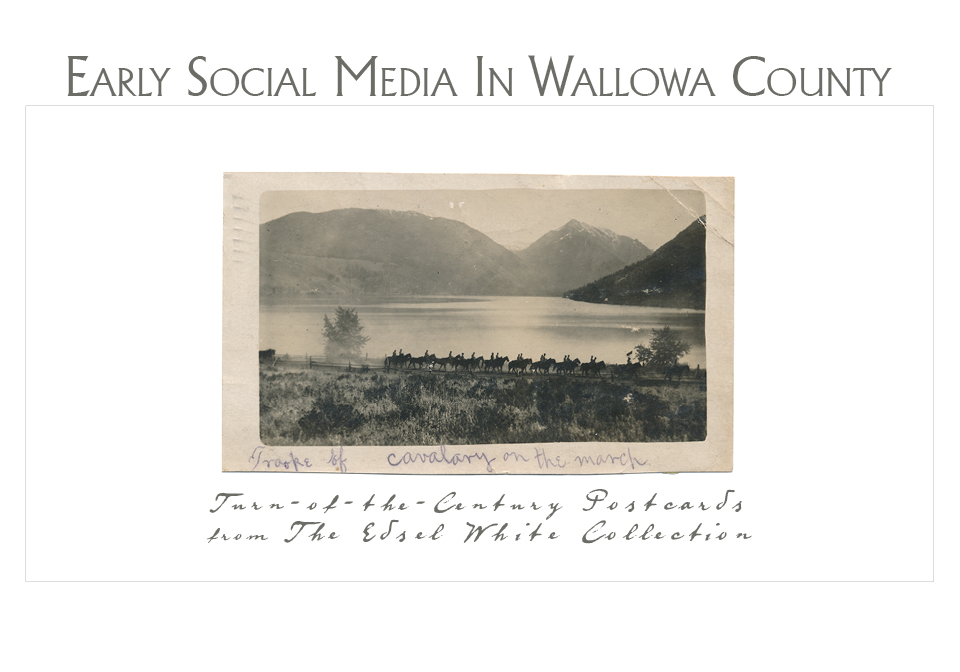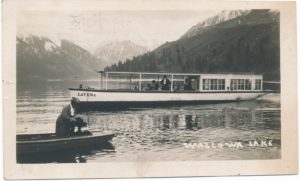
- This event has passed.
Edsel White – One Man’s Collection of Historical Photos
May 3, 2020 - May 30, 2020

Virtual Exhibit with accompanying audio: Click here!
About the Exhibit
 Before Facebook, Instagram and Snapchat, there were photo post cards, America’s first great social media crush. Wallowa County, like the rest of the country, eagerly embraced the new technologies that made it easy for ordinary people to take a “snapshot” and have it printed on photographic paper with a pre-printed post card back. They could then send their own personalized images along with a short note to anyone, anywhere in the world with an address. And a town name and state was all that was needed in the rural U.S.
Before Facebook, Instagram and Snapchat, there were photo post cards, America’s first great social media crush. Wallowa County, like the rest of the country, eagerly embraced the new technologies that made it easy for ordinary people to take a “snapshot” and have it printed on photographic paper with a pre-printed post card back. They could then send their own personalized images along with a short note to anyone, anywhere in the world with an address. And a town name and state was all that was needed in the rural U.S.
This social media revolution was driven by the Eastman Kodak Company. In 1888, Kodak developed the first camera pre-loaded with flexible film. After the photographer had taken the pictures, he or she would send the entire camera back to the company for developing, and a few weeks later would receive the photographs in the mail. While this made it easier for non-professionals to take pictures, the price of the cameras put it out of reach for many.
In 1900, Kodak introduced the Brownie camera. It was lightweight, portable, inexpensive and easy to use, making photography available to amateurs (Kodak’s Brownie was a popular little cartoon sprite of the time intended to appeal to children). In 1902, the company introduced Velox post card paper, and in 1904, the Kodak Brownie 3A, which was designed specifically for taking post card pictures.
The final development that drove this turn-of-the-century social media format was the divided post card back. Prior to 1907, the back of the photo post card was strictly reserved for the address of the recipient. The new 1907 regulations allowed for a message on one side of the card back and the address on the other side. It was the ability to send a photograph with a personal note that really popularized this early social media phenomenon.
With these developments, regular folks (especially young people) began to “post” and take selfies in astounding numbers. Bundles of photo post cards were often sent in one envelope to save on postage. The total number of post cards sent in the mail will never be known; the U.S. Postal Service estimated that nearly 1 billion were sent through the mail in 1913 alone—ten times the population at the time.
In Wallowa County, photo post cards before 1906 are rare, and still scarce in 1907. It’s not until 1908 that the local boom for photo post cards really takes off. Most of the pictures on post cards before that time are lithographic prints of photographs.
The ability of amateurs to produce their own photographs tended to cut into the already thin margins of professional photographers, many of whom supplemented their photo business with second jobs. This was true of local professional photographers like Joseph Henry Romig, a Joseph photographer, and Hugh Davis of Enterprise. Romig ran a combination barbershop and photo gallery, and Davis worked variously as the editor of the Flora Journal, as a carpenter and at farming and ranching.
During the “Golden Age” of the post card between 1907-1915, the distinction between professional and amateur photographers becomes blurrier. Local photographers like Hiram Merry, a farmer who lived in the little community of Grouse near Troy, and Roy Edgmand, a school teacher who taught in many one-room schools in the county, seemed to identify themselves first as “farmer” and “teacher.” The distinction may rest in whether a particular photographer advertised services or had an established studio. And then there were those who were took photographs as a hobby, offering none of their output for sale, but whose work constitutes an important part of our historical record. Frank Reavis of Enterprise is perhaps the premier local example of this.
In any case, the greatest portion of the historic photographic record we have of Wallowa County comes from photo post cards produced by professionals and amateurs during this time period. Many of the photographers remain unknown and un-credited.
In addition to the historic importance of the photographic images themselves, the notes written on the backs provide an interesting look into the lives of the people of the time. By turns tragic, comic and mundane—the universal human need to stay connected and share lives with distant family members, friends and loved ones was as important then as it is now.
The images and words presented in this exhibit come from the important collection of Edsel White, whose love for Wallowa County, its people and its history has led to his amassing hundreds of photographs and documents that add immensely to what we know of our own story. And, thanks to his generosity and willingness to share his passion with others, we’re enriched by being able to see something of our own lives through those who have gone before us.
Edsel White Biography
Edsel White’s relationship to the Wallowa Country began when he came to Wallowa Lake in a bassinet with his parents in 1939. Through his youth, he spent every summer camping with his parents at the Wallowa Lake Methodist Camp. His parents purchased the Reverend Wallis cabin at the Lake in 1955, and in 1957, his father, Reverend Floyd White, was appointed pastor of the Joseph United Methodist Church and Camp manager.
Edsel graduated from La Grande High School in 1956, and with his parents living in the county, spent summers in the Wallowas, working on a ranch, pulling green chain at the Boise Cascade mill—the job, Edsel remembers years later, that taught him the most, and helping at the Methodist Camp as he attended Eastern Oregon College in La Grande. He also helped with the Joseph Methodist Church, where he preached his “first and worst sermons.”
Edsel met Patricia “Pat” Blackburne in 1959, when she came to La Grande to attend EOC, and they were married at the La Grande First United Methodist Church in August of 1962, shortly after Pat graduated. A week later they were on their way to Atlanta, Georgia, where Pat taught school while Edsel studied for his Masters degree at the Chandler School of Theology at Emory University.
They returned to the West, and eventually Edsel received his Doctor of Ministry Degree from San Francisco Theological Seminary, and Pat received her MA degree from Washington State University. For the next 45 years, Edsel served in seven churches, retiring from the Vancouver First United Methodist Church in 2008. The people of that church built the Whites a new retirement cabin on the bank of the Wallowa River above Wallowa Lake, next to the Wallis cabin they had purchased from his parents. They have called it home from early spring to late fall from that time forward, and their children, Brian and Cindy, and their families have all spent parts of their summers with them at the family cabin.
On retirement, Edsel began to devote more time to his lifelong interest in the history of Wallowa County. He has assembled a vast collection of pictures and historical memorabilia, including the postcards in this collection. Edsel shares his pictures and stories with other history buffs, and supports groups working to keep the history of the Wallowa Country alive. He has shared pictures with the Wallowa History Center, the museum in Joseph, and many others, and often trades those images and stories with his good friend, David Weaver, who curated this collection and wrote the brief essays that accompany the images.
Week 1
Week 2
Week 3 Archive
Week 4
